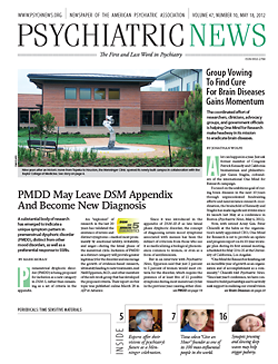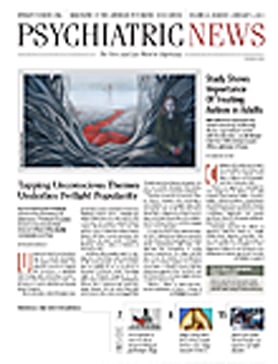For a century now, evidence has been accruing that the hypothalamic hormone oxytocin plays a raft of intriguing roles in reproduction and social behavior. It is crucial for labor and breastfeeding in women, elicits erections in males, promotes social recognition, increases trust, helps people intuit the mental state of others, and reduces anxiety (Psychiatric News, November 21, 2008).
Oxytocin’s antianxiety potential, however, may depend—at least in women—on what version of the hormone they have inherited, a study reported March 15 in Biological Psychiatry suggested.
The study, which was headed by Tiffany Love, Ph.D., a research investigator at the University of Michigan’s Molecular and Behavioral Neuroscience Institute, included 50 healthy young male and female volunteers. They were genotyped to see whether they possessed C variants, G variants, or both of the oxytocin gene and were also evaluated for anxiety with the State-Trait Anxiety Inventory.
The subjects were then exposed to a stress paradigm—moderate levels of sustained deep-muscle pain—and during the stressing, their brains were observed with PET scans for dopamine release. The results from subjects possessing two copies of the C variant of the oxytocin gene or one copy of the C variant and one copy of the G variant were compared with results from subjects possessing two copies of the G variant.
Female subjects who had one or two copies of the C variant were found to be more anxious and to excrete more dopamine in response to stress than were female subjects who had two copies of the G variant. Yet there were no differences in anxiety and dopamine release between male subjects who had one or two copies of the C variant and male subjects who had two copies of the G variant.
Thus, genetic differences in oxytocin might in part explain why some women are particularly susceptible to anxiety and stress compared with their peers, the scientists believe.
The data, Love and colleagues noted in their paper, also suggest that oxytocin influences dopamine selectively in women and as a result may be involved in normal and pathologic states that are more common in women and in which dopamine plays a significant role such as in anxiety or responses to drugs of abuse.
“We are currently examining the associations between these same oxytocin gene polymorphisms and stress-induced activity within the mu-opioid system,” Love told Psychiatric News. “This is another system by which oxytocin may exert its effects to modulate social, motivational, and stress behaviors.”
The study was funded by the National Institutes of Health.


